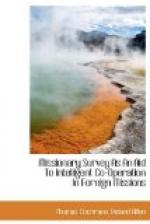If two missions sent by different societies are at work in the same district then, it would be an immense advantage if the survey of the district could be made a joint production. Union for study is often possible, when union in work is impossible, and the common understanding of the situation is most useful.
But if that is impossible, then each society must survey the whole district, and, what an immense amount of labour would be wasted in the preliminary survey, the physical toil of travelling over the country to see the villages and towns, which must be seen to be known, and must be known to reveal the secret of the task which the mission is founded to fulfil, that labour is known only to one who has undertaken such a task, and will soon be known to anyone who starts out conscientiously to survey any district. But it is helpful and illuminating labour, and it would be far better that the heads of two missions should survey the whole of the same district separately than that neither should survey any of it. If both feel that in any real sense that is “their district,” then they ought both to survey it all; for to call a district mine which I have not even surveyed and do not know even by sight is absurd; but it would lighten their labour and help their mutual understanding if they surveyed it together.
If a part of the district overlaps part of another mission district, that part should be surveyed together if possible, or if that is not possible, by each separately.
In this survey the work of no Christian society, however remote ecclesiastically or theologically from the surveyor’s point of view, should be omitted. Ignorance of the work done by others is the worst possible form of separation. There is a sense in which it is true that the more remote the ecclesiastical position of another is from our own, the more near we are to definite opposition, the more important it is that we should know what his work is. We may find in it so much to admire that our annoyance at what seem to us his ecclesiastical absurdities may be softened. If we survey the district together we shall perhaps find there is room for both, even if we each start with the persuasion that there is no room for the other anywhere in the world.
On no account must we fail to consider another’s work. In educational or medical work we must recognise that a school or a hospital which exists, by whomsoever created, in the district makes a difference to the situation. To deal with the district as if that school or hospital did not exist is to deal with an imaginary district, not with the real one; and no one supposes that there is any advantage in dealing with things that are what they are as if they were something else.




